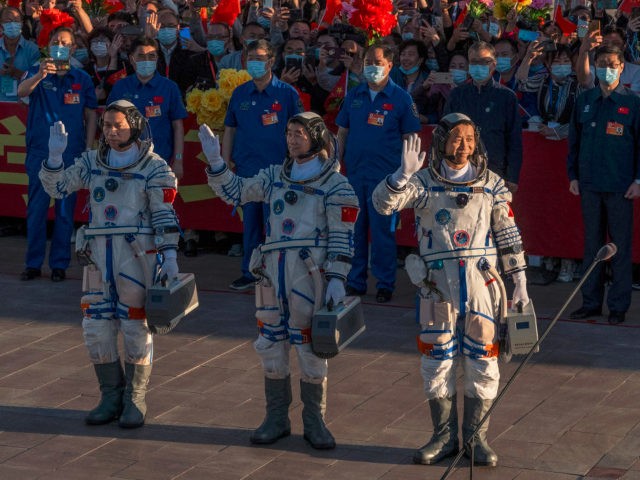Chinese government media effusively praised dictator Xi Jinping on Wednesday for holding a conversation with three Chinese astronauts currently making their homes in a national space station — yet another bizarre public display for Xi in light of his total absence from national vaccination efforts.
China has for months lagged behind other wealthy nations in Chinese coronavirus vaccination rates despite manufacturing some of the most widely used immunization products on earth. Under Xi’s tenure, Chinese citizens have experienced several scandals involving pharmaceutical companies selling expired, watered-down, or otherwise faulty vaccine products, generating widespread distrust. While Xi has used international venues like the World Health Assembly to urge other countries to buy Chinese-made coronavirus vaccines, he has not made any known public appeals to Chinese citizens to trust these products.
Several countries have embraced “Coronavac,” a vaccine candidate by the Chinese company Sinovac Biotech, as the main vaccination product in their national immunization drives and seen a significant spike in coronavirus infections as vaccination rates rose. This month, Sinovac executives began recommending the use of a third dose of the product to increase its poor efficacy rate. Sinovac tested at just 50.38 percent efficacy in clinical trials, the lowest rate for any coronavirus vaccine candidate currently in circulation internationally.
China’s state news agency Xinhua reported Wednesday that Xi spoke to three astronauts on China’s space station to send greetings on behalf of “people of all ethnic groups in the country” and in the name of the Communist Party.
“You are the first astronauts stationed in the core module Tianhe and will stay in space for three months,” Xi was quoted as saying. “We all care about you very much.”
“The construction of the space station is a milestone in China’s space industry, which will make pioneering contributions to the peaceful use of space by humanity,” Xi reportedly told the astronauts. “You are the representatives of those who are striving and climbing in China’s space industry in the new era. I hope you will work closely with each other and complete the upcoming tasks.”
Chinese state television broadcast the video call between the dictator and his subjects in space, which concluded with the astronauts saluting Xi in front of a Communist Party flag.
Xi has similarly made headlines in state media with seemingly less urgent issues than the Chinese coronavirus pandemic, which originated in central Wuhan in late 2019 and continues to rage nationwide, currently ravaging southern Guangdong province. In April, for example, Xi embarked upon a tour of Guanxi and Shaanxi provinces to promote several local culinary offerings, including “specialty fungus” and “river snail rice noodles.”
“Xi said that it’s not an easy task to develop the small rice noodle business into such a large industry,” the state-run Global Times noted admiringly, adding that the dictator “really cares about people’s livelihoods.”
Xi has refused to notify the public if he has received taken any vaccination products against the Chinese coronavirus and most media outlets have stopped asking. Reporters last asked the Chinese Foreign Ministry in January if Xi had been vaccinated, to which spokeswoman Hua Chunying replied, “I have no answer at this moment. Vaccine is our silver bullet for epidemic prevention and for our ultimate victory against the virus.”
Xi’s silence stands in stark contrast with dozens of world leaders who have chosen to receive their vaccines, including Chinese-made products, either on live television or have the event photographed. Even some who have refused to be immunized publicly, like Russian leader Vladimir Putin, still claim to have received a vaccine and urged the public to do the same.
Xi has instead focused his promotional efforts to an international audience. Most recently, in May, Xi urged world leaders at a global public health event to purchase Chinese-made vaccines.
“It is imperative for us to reject vaccine nationalism and find solutions to issues concerning the production capacity and distribution of vaccines, in order to make vaccines more accessible and affordable in developing countries,” Xi said at the time. “Multilateral financial institutions should provide inclusive financing support for vaccine procurement of developing countries.”
Xi has notably refused to distribute Chinese vaccines for free to impoverished countries, instead demanding that “multilateral financial institutions” pay China on their behalf.
China’s vaccination drive has lagged behind similarly sized nations for month, a fact that has not changed Xi Jinping’s absent approach to the problem. The Global Times boasted this week that China, with the world’s largest population, had become the first country in the world to administer 1 billion doses of any kind of coronavirus vaccine candidate, but conceded, “China lags behind some other countries in the number of vaccine doses administered per 100 people,” a more appropriate metric for monitoring vaccine enthusiasm or hesitancy in a population.
“If China continues with such a low vaccination rate, it will not keep up,” Zhong Nanshan, China’s top respiratory disease expert, said in March. “There’s a possibility that in the future, other countries will have [herd immunity] but China doesn’t.”

COMMENTS
Please let us know if you're having issues with commenting.